Collective Study (Issue 03): CCP Youth Work, Settler Colonialism and Ethnic Assimilation
Unity Camps, Great Country Borderlands & Pomegranate Seed Families: How the CCP’s youth work promotes Xi’s assimilationist agenda, settler colonialism, and seeks to transform children into ‘little envoys’, ‘propagandists’ and ‘demonstrators’ of CCP-led ‘ethnic unity’.
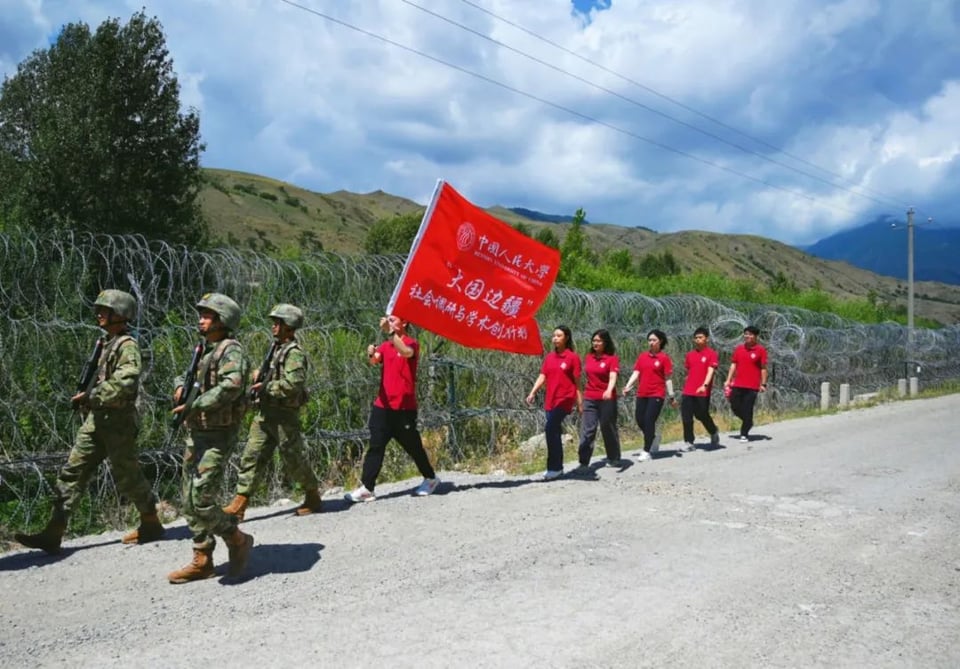
*** If you find Collective Study useful you can sign up for free to get future issues via email and follow Collective Study on Bluesky ***
“Our country’s borders are vast, strategically important, multi-ethnic, and rich in resources. Forging a strong sense of community for the Chinese nation and firmly establishing a correct view of Chinese national history are inseparable from the borders of a great country” — Cha Xianyou (查顯友), Party Secretary of Minzu University and member of the State Ethnic Affairs Commission, speaking at the launch ceremony of the 2024 edition of the ‘Great Country Borderlands’ project.
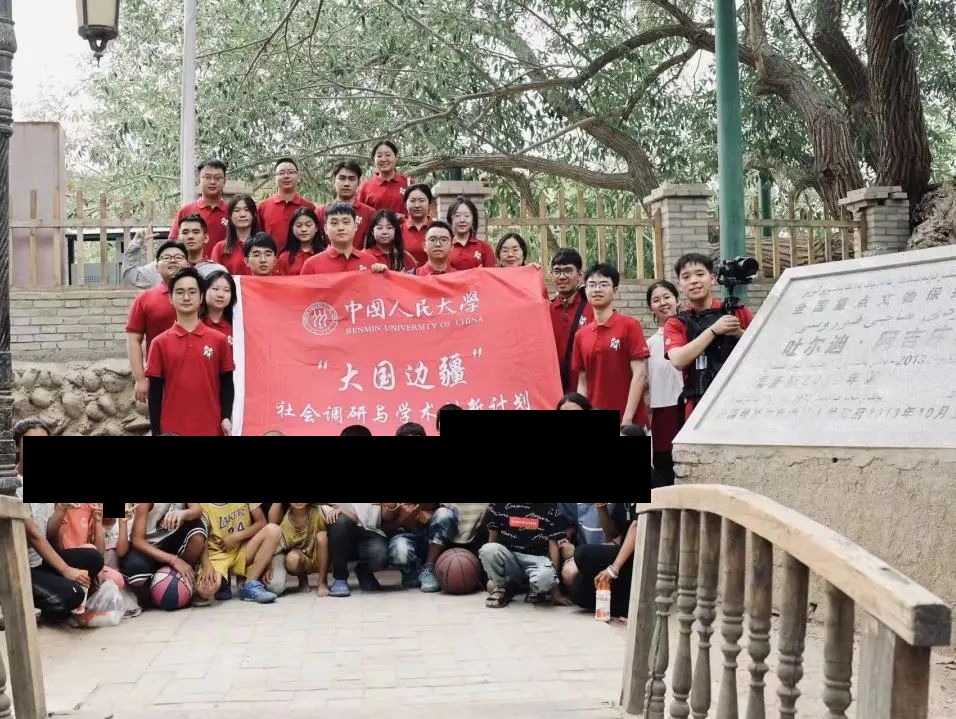
The ‘Great Country Borderlands’ (大國邊疆) is a field research project launched in 2023 by Renmin University and Minzu University in response to Xi’s instructions on ideology and politics education (思政教育).
Reviewing projects like these helps shed light on concrete ways China’s education system, youth organisations, and other groups engage in colonial, assimilationist indoctrination, as well as how they encourage settlement in Xinjiang and Tibet by outside youth.
Thematically, ‘Great Country Borderlands’ covers national security, national unity, economic development, ‘opening up to the outside’, and ecological protection, a state media report on the launch ceremony of the most recent edition noted. The programme lasts around two months over the summer and takes students as far as Guangxi, Jilin and other border areas.
Statements by academics and others involved in the programme emphasised its strategic nature in the context of border governance, including maintaining ‘stability’ in Xinjiang. Though this blog entry focuses on Xinjiang and Tibet, the programme covers other border areas of the country as well.
A key part of the work students undertake appears to involve political indoctrination of people living in border regions. The state media report above describes how some of the participants were organised to visit universities, middle schools and primary schools in unnamed ethnic minority areas in order to develop model courses in ideological and political education. The goal: “strengthen the sense of a community of the Chinese nation”.
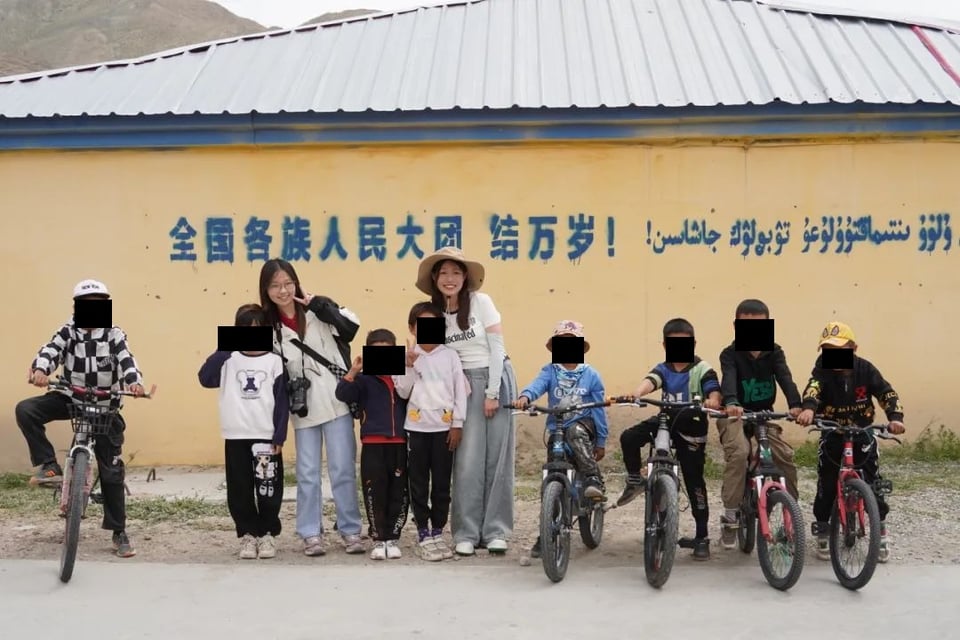
Despite their ostensible focus on inter-ethnic exchange, none of the projects or official work plans reviewed appear to promote the cultures of China’s official ethnic minority except in the context of their commercialisation through mass tourism.
In Tibet, for example, ‘Great Country Borderlands’ student participants promoted Putonghua to local people and “patiently corrected” their pronunciation, according to a Minzu University report.
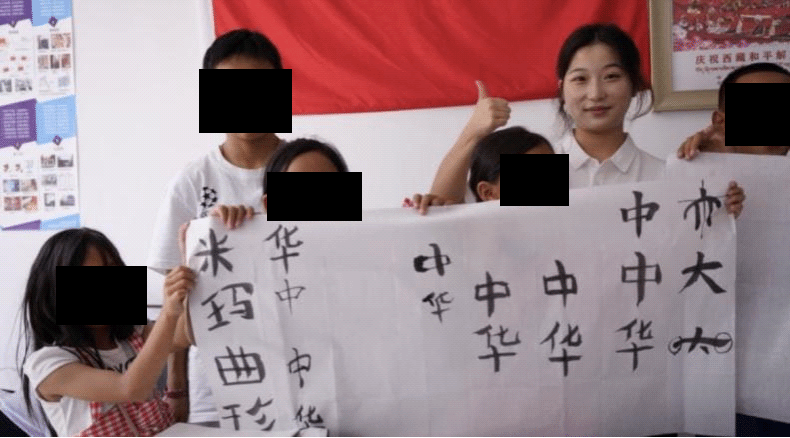
Another participant from Renmin University gave the following testimony:
‘For the first time, I had a real sense of the “border” and “guarding the border”, and a real sense of “Xi Jinping’s Thought on Strengthening the Military”. As a student who is a military veteran, I was deeply moved when I heard the army’s powerful battle song being sung on the border. I think I will take this opportunity to systematically and seriously study and implement Xi Jinping Thought on Strengthening the Military, arm my mind with them, and contribute my own strength to the national defense cause.’
Zhang Donggang, Party Secretary of Renmin University, explained more about the project in a 2024 interview on developments in ideological and political thought education, published by the Studies on Marxism (馬克思主義研究) journal:
“Under the theme of ‘Forging a sense of community for the Chinese nation, advancing high quality development of border ethnic regions’ (鑄牢中華民族共同體意識 推動邊疆民族地區高質量發展) we have comprehensively launched the ‘Great Country Borderlands’ (大國邊疆) educational project targeting 9 land border provinces, 45 land border cities, and 22,000 kilometers of land borders. We have organized teachers and students to go deep into the frontlines of the border, enter border barracks, interview border cadres, and record life in the border. We have jointly built the ‘Frontier County Colleges and Universities Ideological and Political Education Integration Alliance’ (邊疆縣域大中小學思政教育一體化建設聯盟) and in the process, we strive to build a ‘Great Borderlands’ database, case library and image library, and use academic language to tell the “ongoing development history” of the great border in the new era.”
Zhang outlined these initiatives as important work in constructing ‘big ideology and politics courses’ (大思政课). Not to be mistaken for a massively open online course (MOOC), the term appears to refer to a revamped and expanded approach to ideology and politics courses, according to one official explanation of the term.
This work is particularly significant for Zhang as Party Secretary of Renmin University: he accompanied Xi Jinping during an April 2022 inspection of the campus where Xi gave a speech precisely on building ‘big ideology and politics courses’.
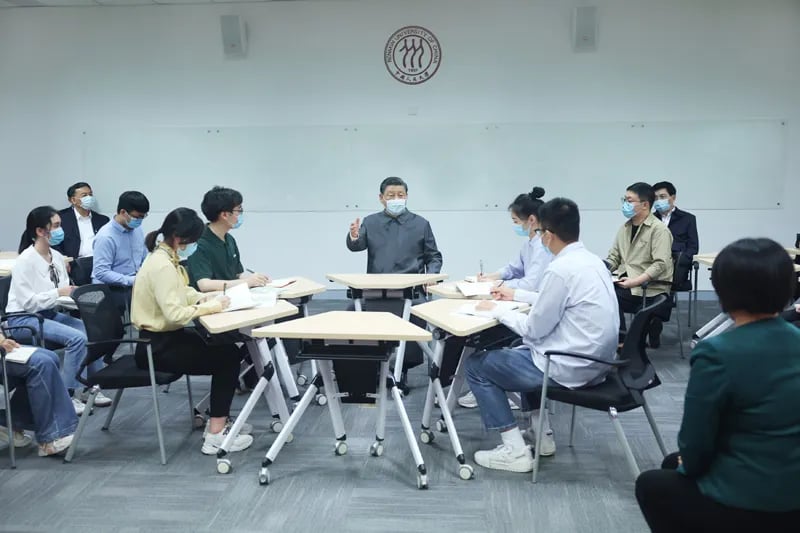
Following that speech, the Ministry of Education and ten other departments issued a notice on the Work Plan for Comprehensively Promoting the Construction of “Big Ideological and Political Courses” (全面推進"大思政課"建設的工作方案) in July 2022 which aimed at increasing the presence and influence of ideology and politics education, particularly the various branches of Xi Jinping Thought.
Unity Camps
Unity Camps (同心營) involve thousands of younger children from all around the country and all official ethnic groups and see them taken on “ethnic unity” indoctrination tours and exchanges. It is important to note that ‘camps’ in this instance is a direct and accurate translation from the Chinese 營 and should be understood in the sense of an activity camp or summer camp, rather than any form of internment or detention facility.
Run by groups including United Front orgs the Community Youth League and the All China Youth Federation (ACYF), the explicit goal is to build the broadest and most consolidated patriotic youth united front line.
An ACYF report on the 14th edition of the Unity Camp detailed an (idealised) outcome for one of the 550 “ethnic youth” participants:
‘When he walked into the Mausoleum of the Yellow Emperor to visit the Education and Practice Base for Strengthening the Consciousness of the Chinese Nation Community in Shaanxi Province, he said, “All of our (China’s) ethnic groups are looking for roots here, and we must join hands and hearts here, gather together, and set off towards the Chinese dream of the great rejuvenation of the Chinese nation.” The seeds of “the Chinese nation is one family” were sown in hearts full of hope.’
The report noted that ACYF had found Unity Camps to be an effective, interactive mode of guiding youth to strengthen the “five recognitions” (五個認同) and “four togethers” (四個與共) concepts. The ‘five recognitions’ refers to the demand for all ethnic groups to have a high degree of recognition of the great motherland, the Chinese nation, Chinese culture, the CCP, and Socialism with Chinese Characteristics; “four togethers” signifies that all ethnic groups share weal and woe, honour and disgrace, life and death, and one destiny.
For that reason, ACYF proposed building more ‘education bases for forging a sense of community for the Chinese nation’ (鑄牢中華民族共同體意識教育基地) as well as adding related content into existing patriotic education bases, youth activity centres and other sites. The ACYF also proposed, according to the report, incorporating such content into the national education system and colleges and teacher training in order to give full play to the role of schools in “rallying the hearts” of young people, especially in ethnic minority areas. (It’s worth pausing to reflect here on the fact that the United Nations recognises ACYF as an NGO…)
In Heilongjiang, one Unity Camp included home visits to local families for 50 primary and secondary students from Xinjiang plus visits to military and sci-tech sites to “forge students’ sense of a community of the Chinese nation”.
A Unity Camp under the banner ‘a family as close as pomegranate seeds’ run by the CCP Youth League and Guangdong and Fujian provinces’ paired assistance to Xinjiang (對口支援新疆) programmes took Xinjiang youth to visit revolutionary sites, emphasising how they “deeply felt Red Culture” during their trip in Guangdong.
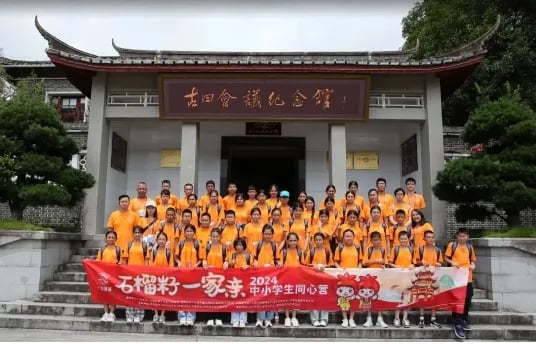
Wide ranging CCP Youth League notices published in December 2020 elaborated the organisation’s strategies for Xinjiang and Tibet work.
‘On the implementation plan for mobilizing the whole CCP Youth League to support Xinjiang youth work’ (關於動員全團力量支持新疆青少年工作的實施方案)
‘On the implementation plan for mobilizing the whole CCP Youth League to support Tibet youth work’ (關於動員全團力量支持西藏青少年工作的實施方案)
For its Xinjiang work plan, the Youth League stated that over the coming 3 years, 8000 Xinjiang middle school students would be organised to participate in Unity Camps to “feel the profound Chinese culture”, “great developments of the motherland”, “lay a strong ideological foundation for loving China”, and “serve as good ”propagandists” (“宣傳員”) for national unity”. The document put the word ‘propagandist’ in quotation marks, meaning the children should be able to promote the CCP’s positions as if they were propagandists, and not that they were to be given official or semi-official roles.
The intention to transform Xinjiang youth into indoctrinated propagandists for CCP is repeated elsewhere in the plan. It called for 6000 Xinjiang students currently elsewhere in China to participate in a “I Practice Ethnic Unity” (“民族團結我踐行”) practical social activity and other activities so they will “realise deeply the historical fact that Xinjiang has been a part of China since ancient times” and become good ‘demonstrators’ (‘示範員’) of ethnic unity”.
Some other noteworthy parts of the Youth League’s Xinjiang plan (condensed at times for brevity):
Implement the Xinjiang-Inland Youth Exchange Program: Within three years, 500,000 young people of all ethnic groups in Xinjiang and the mainland to be organized to write letters and pair up, and 20,000 Xinjiang youth to be organized to go out of Xinjiang and experience the mainland, to “promote exchanges and integration” among young people; “constantly build a strong sense of a community of the Chinese nation”.
In the next three years, 6,000 primary school students from Xinjiang will be organized to go to the mainland to participate in the “Pomegranate Seed Family” activity. Through short-term primary school classes, summer (winter) camps, holiday exchange camps, etc., young people of all ethnic groups will be able to stay together, play together, grow up together from elementary school and become “little envoys” (“小使者”) of national unity.
Deepen the special project of college student volunteer service in western China and Xinjiang. We will strive to send 30,000 young volunteers to Xinjiang within three years. […] we will select more qualified college student volunteers to serve in Xinjiang, especially in southern Xinjiang and the Corps
Implement the plan for young people to start businesses in Xinjiang. We will strive to guide more than 10,000 young people to practice and work in Xinjiang within three years. Through employment recruitment, job internships, paired assistance and other means, we will mobilize and encourage young people from the mainland to go to Xinjiang. We will promote the recipient areas to introduce more preferential policies and strive to ensure that young talents can come, work well and stay.
Regularly publish job positions to mobilize young people from vocational colleges in the mainland, young migrant workers, and rural youth to work in Xinjiang.
Encourage volunteers of the Western Plan and PLA officers and soldiers currently in Xinjiang to stay and work in Xinjiang after their military service ends. Promote local governments to introduce preferential policies to encourage young people who are doing internships in Xinjiang to stay and work in Xinjiang for a long time.
The Youth League has an equivalent Tibet work plan with many overlapping or identical measures. The selection of noteworthy extracts below similarly underlines the importance of political indoctrination and settler colonialism:
Within three years, organize 100,000 young people of all ethnic groups in Tibet and the mainland to write letters and pair up, organize 10,000 Tibetan youth to go out of Tibet and experience the mainland, and promote exchanges and integration among young people of all ethnic groups. Firmly grasp the correct political direction…so that young people of all ethnic groups can play together, learn together, and grow together, forge a strong sense of community of the Chinese nation, and continuously enhance their identification with the great motherland, the Chinese nation, Chinese culture, the Communist Party of China, and socialism with Chinese characteristics.
Organize 3,000 Tibetan primary school students to participate in the “Pomegranate Seed Family” activity in the mainland within three years. Through Red themed education, traditional cultural experiences, transfer learning exchanges, homestay life experiences and other methods, the content of ideological education is closely integrated with social situations, so that the seeds of love for China will sprout in the hearts of Tibetan teenagers.
Organize 2,000 Tibetan middle school students to visit mainland universities within three years to carry out summer “Unity Camp” activities. Through ideological and theoretical learning, visits to revolutionary sites, and discussions and sharing, we will help young people of all ethnic groups to continuously lay a solid ideological foundation for loving China.
Organize 5,000 Tibetan college students from the mainland to participate in the “I practice national unity” social practice activities within three years. […] carry out lectures on strengthening the sense of community of the Chinese nation, organize them to go deep into the grassroots to understand the national conditions, social conditions and people’s sentiments, feel, think and analyze in practice, continuously deepen their understanding and recognition of national unity, and lead and motivate the young people around them to strive to be practitioners of national unity.
Implement a two-way employment and business development plan for young people in Tibet and the mainland. Through job recruitment and internships, help Tibetan college students to find employment and start businesses in the mainland, encourage mainland college students to find employment and start businesses in Tibet, encourage young people of all ethnic groups to start businesses together, and strive to make tangible contributions to promoting high-quality economic and social development in Tibet.
Support the implementation of the pilot program for employment and entrepreneurship of Tibetan college students outside the region, and strive to coordinate the central and national agencies, central enterprises, provinces supporting Tibet and other provinces to provide 3,000 internship positions in the mainland for Tibetan college students within three years, and provide a certain number of targeted recruitment positions.
Regularly publish job vacancies to encourage mainland college students to work in Tibet.
Organize young people rooted in Tibet to go to mainland universities to tell their personal experiences, and encourage more aspiring young people to go to Tibet and the grassroots to devote themselves to frontier construction. Encourage volunteers of the Western Plan currently serving in Tibet to stay in Tibet to work after the service period expires.
There are also possible signs that the state may be increasing the role of inter-ethnic exchanges in existing state development programmes for Xinjiang, in line with instructions from the CCP leadership. In July 2024 for instance, the paired assistance for Xinjiang command headquarters of Guangdong and Fujian provinces signed a framework agreement on strengthening ethnic exchanges and integration. Under this agreement the provinces would orient their work towards enhancing “ethnic unity”.
The report noted that Guangdong province allocated 127 million yuan (16 million euros) for activities under the banner “Guangdong and Xinjiang Together for Ethnic Unity” (民族團結粵新同行) . The initiative included plans to build an online “pairing and correspondence platform” (结对和书信交往平台) for more than 200,000 Guangdong and Xinjiang youth, as well non-youth focused exchanges such as support for 50,000 Guangdong tourists to go sightseeing in Kashgar.
Given limited time available for this research, the vast geographic scope and sheer number of actors involved in all of the above, this blog can only offer at best a narrow snapshot of recent state-led projects. Future entries will hopefully be able to examine aspects of CCP youth work in border regions more closely.
If you find Collective Study useful you can sign up for free to get future issues via email and follow Collective Study on Bluesky.
Questions, comments and corrections? Contact collectivestudysession@protonmail.com